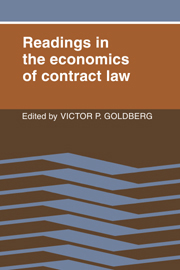Book contents
- Frontmatter
- Contents
- Preface
- Readings in the economics of contract law
- Part I Some preliminaries
- Part II Contract law and the least cost avoider
- Part III The expectation interest, the reliance interest, and consequential damages
- Part IV The lost-volume seller puzzle
- Part V Specific performance and the cost of completion
- Part VI Power, governance, and the penalty clause puzzle
- Part VII Standard forms and warranties
- Part VIII Duress, preexisting duty, and good faith modification
- Part IX Impossibility, related doctrines, and price adjustment
- Questions and notes on impossibility and price adjustment
- References
- Index of cases
- Author index
- Subject index
Part III - The expectation interest, the reliance interest, and consequential damages
Published online by Cambridge University Press: 10 November 2010
- Frontmatter
- Contents
- Preface
- Readings in the economics of contract law
- Part I Some preliminaries
- Part II Contract law and the least cost avoider
- Part III The expectation interest, the reliance interest, and consequential damages
- Part IV The lost-volume seller puzzle
- Part V Specific performance and the cost of completion
- Part VI Power, governance, and the penalty clause puzzle
- Part VII Standard forms and warranties
- Part VIII Duress, preexisting duty, and good faith modification
- Part IX Impossibility, related doctrines, and price adjustment
- Questions and notes on impossibility and price adjustment
- References
- Index of cases
- Author index
- Subject index
Summary
In the event of a contract breach, the victim is entitled to a remedy in the form of money damages, an injunction (specific performance), or sometimes reformation. In Part III we will focus on money damages. Damages are commonly classified as expectation, reliance, and restitution damages. The first would put the victim in as good a position as if the contract had been performed. Reliance damages compensate for expenditures made in preparation for performance of the contract. Restitution damages are equal to the benefits conferred by the victim on the breaching party (in the simplest case a refund of cash to a buyer when the seller refuses to perform). If neither party has yet performed, the restitution remedy is equivalent to rescission: tearing up the contract.
Historically, contract law focused almost entirely on vindication of the expectation interest. The First Restatement of Contracts did not explicitly recognize reliance damages. That has changed in the past half century, and the paper by Lon Fuller and William Perdue, from which Selection [3.1] is taken, played an important role in that change. Indeed, they suggested the primacy of the reliance interest and raised a provocative question: If no one has yet relied upon a promise, why should society bother to enforce it? Their answer is given in Selection [3.1]. Building on their suggestions, I argue in Selection [3.2] that one reason for enforcing such contracts, and for reckoning as damages the difference between the market price and the contract price, is to create a property right in the price. The questions that conclude Part III-A draw out some of the implications of that argument for measurement of damages.
- Type
- Chapter
- Information
- Readings in the Economics of Contract Law , pp. 75 - 76Publisher: Cambridge University PressPrint publication year: 1982



